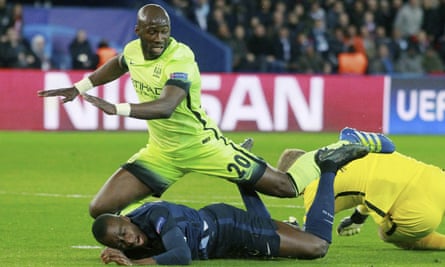It’s a billion pounds! Can you even imagine a billion pounds? What would a billion pounds actually look like in real life as opposed to spelled out in words on a yellow ticker? Is it enough to fill the swimming pool of a super‑agent’s house or float down from several helicopters to cover a whole football pitch?
Once upon a time, in the seasons that followed the 1992 Premier League rebrand, as everything around football ballooned, fuelled by a whirlwind of new money and new television deals and new players and managers and owners from the wider world, the discussion quite often turned to concerned debate about when the bubble would burst. Surely football would eventually eat itself. That was part of the conversation when Blackburn Rovers – now bottom of the Championship – won the league in 1995 financed by their lifelong supporter Jack Walker. That was central to the analysis when Leeds United – currently a fraction higher than Blackburn around the basement of English football’s second tier – lived the dream, flew close to a Champions League final and were scorched.
Yet, here we are in 2016 spending more than ever. The Premier League bubble seems to be made of something apparently unburstable. What can possibly pierce a market so powerful it can do everything from welcome a coveted world star such as Paul Pogba for more than even Real Madrid would countenance, recycle a cluster of quite good attackers such as Christian Benteke, Yannick Bolasie, and André Ayew in the £20m-£30m bracket, and find no obvious buyer for players of the stature of Joe Hart, so he gets parked elsewhere, with Manchester City still paying the bulk of his salary?
Actually, these elements are not entirely new. Ángel Di María was a coup when he went to Old Trafford for a whacking sum a couple of years ago. Tottenham Hotspur spent £30m on Roberto Soldado and City a similar amount on Robinho without great returns. In the early Roman Abramovich years at Chelsea it was not unusual to be left with expendable talent that could not be easily resold, such as Hernán Crespo, who was loaned out until he left for free.
The Premier League, right now, is left resembling a footballing Brexit of sorts – the English clubs want to do business with clubs abroad but also have created their own market with its own overblown values. Arsène Wenger, whose background in economics gives him a specific insight into the machinations of football’s finances, is unimpressed with this monster that generally requires Premier League clubs to pay over the odds. “Today in Europe you have two markets, one for the English clubs and one for the rest of Europe,” Wenger said recently. “When the buyer is English that multiplies the transfer by two, three or sometimes by 10. If an English club does not come for a player he is worth £5m. If an English club comes in he is worth £35m, £40m or £50m.” It makes the billion look a bit silly.

The subplot of the great Premier League talent chase, though, concerns the problems that stem from buying expensively and adding a high-end salary, given the nature of transfers is that some just do not work out. What to do with the pricey mistakes, the no-longer-wanteds? The trouble with living in a separate market to the rest of Europe is that these problems are almost impossible to sell on for someone else to untangle.
The Premier League clubs may have proved themselves lavish spenders but they are not in a position to be very good sellers. Once in a while a talent of Gareth Bale’s quality comes along to tempt Europe’s finest clubs to part with vast sums. But in the main, finding ready buyers who are willing to take on Premier League wages for an out-of-favour player is like kicking a ball around while waiting for Godot.
The billion-pound window has clunked into the deadline day of the desperate season-long loan. Generally speaking, the instigators have been the clubs trying to streamline their squads and prune off the players who were always likely to be picked scarcely, if at all. It is one thing using the loan system as part of the business plan – as Chelsea have done in recent seasons. It is another to use it to develop young players. However, this summer there has been a shift, with so many clubs resorting to it to try to deal with complicated “assets”.
Among the loan deals for established players – rather than prospects – who have been farmed out this window are Arsenal’s Wojciech Szczesny, Calum Chambers, Jack Wilshere and Joel Campbell. Chelsea have parked Loïc Rémy, Baba Rahman and, most bizarrely, Juan Cuadrado on a three-year loan deal. Manchester City shunted out Hart, Eliaquim Mangala, Samir Nasri and Wilfried Bony. Manchester United Adnan Januzaj. Other internationals who went into deadline day in limbo about how much they would play at their parent club include Bastian Schweinsteiger, Marcos Rojo, Ashley Young, Yaya Touré and Mamadou Sakho.
Elsewhere, Tottenham have loaned Federico Fazio and Nabil Bentaleb, Sunderland waved off Jeremain Lens, and Swansea City have offloaded Bafétimbi Gomis temporarily to Marseille. Big wages are big wages across the Premier League.
So here we are. Maybe the fact English clubs spent a billion in one transfer market excites you. Maybe it means something profound to the average Joe who loves their club and is pleased to have signed a player for an eye-watering sum as they strain to find the personal funds to cover their passion by buying match tickets, shelling out travel costs and paying satellite TV subscriptions. Maybe not. Maybe all is not quite so well in the weird booming world of Premier League transfers.

Comments (…)
Sign in or create your Guardian account to join the discussion